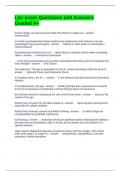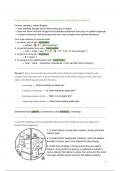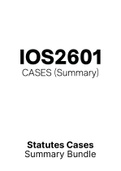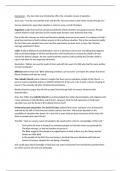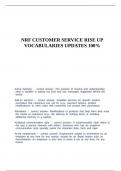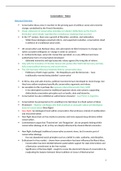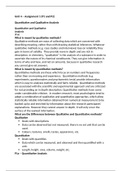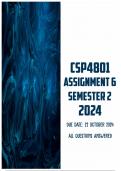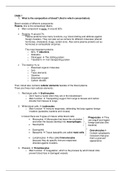Farmaceutische Wetenschappen Bach1
Pathofysiologie 1: algemene begrippen
1. Vloeistofcompartimenten in het organisme
1.1 Verdeling van water
Het organisme bestaat uit:
18% proteïnen
7% mineralen
15% vet
60% water:
o 40% intracellulaire vloeistof (ICV)
o 20% extracellulaire vloeistof (ECV)
Hieruit nemen de cellen zuurstof en nutriënten op en hierin lozen ze hun metaboliet
afvalstoffen
ECV:
15% interstitiële (intercellulaire) vloeistof (ISV)
5% vasculaire vloeistof (plasma)
1.2 Samenstelling lichaamsvloeistoffen
, Farmaceutische Wetenschappen Bach1
Plasma en ISV: nagenoeg identiek, behalve eiwitten (plasma > ISV)
Grote verschillen ECV-ICV:
ECV: voornamelijk Na+ - en Cl- - ionen
ICV: voornamelijk K+, fosfaten en eiwitten
Ca2+-concentratie in de ECV id veel hoger dan in de ICV
Homeostase van de samenstelling van de lichaamsvloeistoffen is essentieel, bv als extracellulaire K +-
concentratie toeneemt van 4 naar 8 mol/L, ontstaan reeds storingen in het hartritme.
1.3 Meten van het volume van de lichaamsvloeistoffen
Distributievolume: totale hoeveelheid toegediend/concentratie in de staal
De totale hoeveelheid lichaamswater: via bepalen van het distributievolume van 0,0 of
aminopyrine.
Meting van het plasmavolume vereist moleculen die in de bloedbaan blijven in.
Meting van het volume van de extracellulaire vloeistof (ECV) moeilijk, meest accuraat met
inuline.
Het volume van de extracellulaire vloeistof (ECV) is zo niet meetbaar, dus via “ECV -
plasmavolume”.
Het volume van interstitiële vloeistof (ISV) is zo niet meetbaar, dus via totale lichaamswater –
ECV.
2. De celmembraan
2.1 Structuur
Lipiden: dubbele laag fosfolipiden. Fosfolipiden zijn opgebouwd uit:
Een polair-hydrofiel gedeelte (de fosfaatgroep) dat zich steeds naar het waterig milieu richt
Een apolaire-hydrofoob gedeelte (de vetzuurketens) dat zich steeds naar membraan richt
Proteïnen: onderbreken de dubbele laag fosfolipiden op verschillende plaatsen en oefenen diverse
functies uit zoals:
Structureel bouwelement
Transportproteïnen (carriers): maken transport door membraan voor moleculen mogelijk
Ionenkanalen: maken transport van specifieke moleculen doorheen celmembraan mogelijk
Receptoren: hierop binden neurotransmitters, hormonen en sommige geneesmiddelen
Enzymen: katalyseren omzettingen ter hoogte van de celmembraan
2.2 Transport doorheen celmembraan
2.2.1 Passieve diffusie
Passieve diffusie kan enkel gebeuren via de concentratiegradiënt . De permeabiliteit van de
celmembraan voor een molecule via passieve diffusie is afhankelijk van de grootte, de lading en de
vetoplosbaarheid van de molecule.
De lipidenlaag is permeabel voor water, maar niet permeabel voor grote moleculen (bv eiwitten en
geneesmiddelen), geladen moleculen en sterk polaire moleculen.
O2 en N2: klein, ongeladen en apolaire, goed doorlaatbaar
H20: polair maar klein en ongeladen, nog doorlaatbaar
Glucose: groot en polair, beperkt doorlaatbaar via trage diffusie
Ionen (Na+, Cl+), geladen, niet mogelijk te diffunderen door het celmembraan
2.2.2 Gespecialiseerde mechanismen
Pathofysiologie 1: algemene begrippen
1. Vloeistofcompartimenten in het organisme
1.1 Verdeling van water
Het organisme bestaat uit:
18% proteïnen
7% mineralen
15% vet
60% water:
o 40% intracellulaire vloeistof (ICV)
o 20% extracellulaire vloeistof (ECV)
Hieruit nemen de cellen zuurstof en nutriënten op en hierin lozen ze hun metaboliet
afvalstoffen
ECV:
15% interstitiële (intercellulaire) vloeistof (ISV)
5% vasculaire vloeistof (plasma)
1.2 Samenstelling lichaamsvloeistoffen
, Farmaceutische Wetenschappen Bach1
Plasma en ISV: nagenoeg identiek, behalve eiwitten (plasma > ISV)
Grote verschillen ECV-ICV:
ECV: voornamelijk Na+ - en Cl- - ionen
ICV: voornamelijk K+, fosfaten en eiwitten
Ca2+-concentratie in de ECV id veel hoger dan in de ICV
Homeostase van de samenstelling van de lichaamsvloeistoffen is essentieel, bv als extracellulaire K +-
concentratie toeneemt van 4 naar 8 mol/L, ontstaan reeds storingen in het hartritme.
1.3 Meten van het volume van de lichaamsvloeistoffen
Distributievolume: totale hoeveelheid toegediend/concentratie in de staal
De totale hoeveelheid lichaamswater: via bepalen van het distributievolume van 0,0 of
aminopyrine.
Meting van het plasmavolume vereist moleculen die in de bloedbaan blijven in.
Meting van het volume van de extracellulaire vloeistof (ECV) moeilijk, meest accuraat met
inuline.
Het volume van de extracellulaire vloeistof (ECV) is zo niet meetbaar, dus via “ECV -
plasmavolume”.
Het volume van interstitiële vloeistof (ISV) is zo niet meetbaar, dus via totale lichaamswater –
ECV.
2. De celmembraan
2.1 Structuur
Lipiden: dubbele laag fosfolipiden. Fosfolipiden zijn opgebouwd uit:
Een polair-hydrofiel gedeelte (de fosfaatgroep) dat zich steeds naar het waterig milieu richt
Een apolaire-hydrofoob gedeelte (de vetzuurketens) dat zich steeds naar membraan richt
Proteïnen: onderbreken de dubbele laag fosfolipiden op verschillende plaatsen en oefenen diverse
functies uit zoals:
Structureel bouwelement
Transportproteïnen (carriers): maken transport door membraan voor moleculen mogelijk
Ionenkanalen: maken transport van specifieke moleculen doorheen celmembraan mogelijk
Receptoren: hierop binden neurotransmitters, hormonen en sommige geneesmiddelen
Enzymen: katalyseren omzettingen ter hoogte van de celmembraan
2.2 Transport doorheen celmembraan
2.2.1 Passieve diffusie
Passieve diffusie kan enkel gebeuren via de concentratiegradiënt . De permeabiliteit van de
celmembraan voor een molecule via passieve diffusie is afhankelijk van de grootte, de lading en de
vetoplosbaarheid van de molecule.
De lipidenlaag is permeabel voor water, maar niet permeabel voor grote moleculen (bv eiwitten en
geneesmiddelen), geladen moleculen en sterk polaire moleculen.
O2 en N2: klein, ongeladen en apolaire, goed doorlaatbaar
H20: polair maar klein en ongeladen, nog doorlaatbaar
Glucose: groot en polair, beperkt doorlaatbaar via trage diffusie
Ionen (Na+, Cl+), geladen, niet mogelijk te diffunderen door het celmembraan
2.2.2 Gespecialiseerde mechanismen

